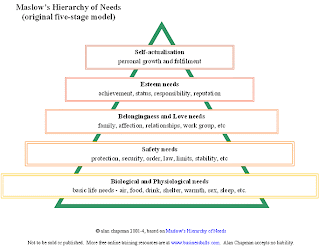
BACKGROUND
Abraham Harold Maslow was born April 1, 1908 in Brooklyn, New York. He was the first of seven children born to his parents, who themselves were uneducated Jewish immigrants from Russia. His parents, hoping for the best for their children in the new world, pushed him hard for academic success. Not surprisingly, he became very lonely as a boy, and found his refuge in books.He received his BA in 1930, his MA in 1931, and his PhD in 1934, all in psychology, all from the University of Wisconsin. A year after graduation, he returned to New York to work with E. L. Thorndike at Columbia, where Maslow became interested in research on human sexuality. He spend his final years in semi-retirement in California, until, on June 8 1970, he died of a heart attack after years of ill health.
THEORY

Maslow took this idea and created his now famous hierarchy of needs. Beyond the details of air, water, food, and sex, he laid out five broader layers: the physiological needs, the needs for safety and security, the needs for love and belonging, the needs for esteem, and the need to actualize the self, in that order.
2. The safety and security needs. When the physiological needs are largely taken care of, this second layer of needs comes into play.In the ordinary American adult, this set of needs manifest themselves in the form of our urges to have a home in a safe neighborhood, a little job security and a nest egg, a good retirement plan and a bit of insurance.
3. The love and belonging needs. When physiological needs and safety needs are, by and large, taken care of, a third layer starts to show up. our day-to-day life, we exhibit these needs in our desires to marry, have a family, be a part of a community, a member of a church, a brother in the fraternity, a part of a gang or a bowling club. It is also a part of what we look for in a career.
4. The esteem needs. Next, we begin to look for a little self-esteem. Maslow noted two versions of esteem needs, a lower one and a higher one. The lower one is the need for the respect of others, the need for status, fame, glory, recognition, attention, reputation, appreciation, dignity, even dominance. The higher form involves the need for self-respect, including such feelings as confidence, competence, achievement, mastery, independence, and freedom.In modern countries, most of us have what we need in regard to our physiological and safety needs. We, more often than not, have quite a bit of love and belonging, too. It’s a little respect that often seems so very hard to get!
All of the preceding four levels he calls deficit needs, or D-needs.



0 comments:
Post a Comment